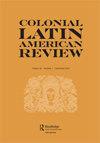The pauper’s paradise: Franciscan perspectives on American diets in sixteenth-century New Spain
IF 0.4
2区 历史学
Q1 HISTORY
引用次数: 0
Abstract
The first Spaniards to arrive in the Americas, friars and sailors alike, lost no time in learning about American diets. Fifteenthand sixteenth-century writings record Europeans’ initial attempts to make sense of the continent’s diverse flora through comparisons to familiar foodstuffs, as well as prompt introduction of European species and the reverse transport of American plants to Spain (Fernández de Oviedo y Valdés 2016, 91, 97– 106; Martire d’Anghiera 1998, 46, 69; Fernández de Navarrete 1922, 250). Over the course of the sixteenth century, shifts in diet would provoke changes in ecology, medicine, and natural history that would lay the foundation for a new colony (Earle 2012; Crosby 2003, esp. ch. 3; Sluyter 1996; Melville 1994). While some Spanish interest in American foodways was born of necessity, recent scholarship has highlighted the role of other cultural factors in shaping how American cultivars and practices were seen by the new arrivals (Delbourgo and Dew 2008; Schiebinger and Swan 2005; Schiebinger 2005; Gómez 2017). In New Spain, particularly in central Mexico, religion played a central role. This area was one of the first zones of sustained contact between Europeans and Americans; many of the Spaniards on the front lines there were Observant Franciscan missionaries who brought with them their own thinking on how diet affected both physical health and spiritual well-being. The missions they built were hubs of knowledge exchange where the friars introduced European foods and medicines while also drawing heavily on indigenous expertise about these topics (Tucker and Janick 2020). Consequently, some of the earliest European texts about American plants were written at these Franciscan missions (Gimmel 2008). The Franciscan discourse about diet in central Mexico marked a continuation of medieval discussions within the Order about food’s relationship with the human body, the commonwealth, and a virtuous lifestyle. In fifteenth-century Europe, food was central to healthcare and religious practice, and one’s spiritual and physical health depended on eating the right things at the right times. Spanish regimen sanitatis literature extolled the virtues of moderation for bodily health, recommending a well-balanced diet based around bread, meat, and wine; from a religious perspective, fasting and abstention were seen as key to the refinement of one’s soul. Abstention was particularly characteristic of the Observant branch of the order, which over the preceding decades had separated from the Conventual branch of the same by privileging an ascetic vision of the holy life that emphasized the value of absolute poverty (Turley 2016, 1–3; Milhou 1983; Roest乞丐的天堂:方济各会对16世纪新西班牙美国饮食的看法
第一批到达美洲的西班牙人,无论是修士还是水手,都不失时机地学习了美国人的饮食。十五世纪和十六世纪的著作记录了欧洲人最初试图通过与熟悉的食物进行比较来理解欧洲大陆多样的植物群,以及迅速引入欧洲物种和将美国植物反向运输到西班牙(Fernández de Oviedo y Valdés 2016,91,97–106;Martire d‘Anghiera 1998,46,69;Fernás de Navarrete 1922,250)。在16世纪的过程中,饮食的变化将引发生态学、医学和自然史的变化,这将为新的殖民地奠定基础(Earle 2012;克罗斯比2003,特别是第3章;Sluyter 1996;梅尔维尔1994)。虽然一些西班牙人对美国美食的兴趣是出于必要,但最近的学术研究强调了其他文化因素在塑造新移民对美国品种和做法的看法方面的作用(Delbourgo和Dew,2008年;Schiebinger和Swan,2005年;Schieb inger,2005年,戈麦斯,2017年)。在新西班牙,特别是在墨西哥中部,宗教发挥了核心作用。这个地区是欧洲人和美国人之间最早持续接触的地区之一;许多在前线的西班牙人都是方济各会的传教士,他们带来了自己关于饮食如何影响身体健康和精神健康的想法。他们建立的使团是知识交流的中心,修士们在这里介绍了欧洲食品和药品,同时也大量借鉴了当地关于这些主题的专业知识(Tucker和Janick 2020)。因此,一些最早的关于美国植物的欧洲文本是在这些方济各会传教会上写的(Gimmel 2008)。方济各会关于墨西哥中部饮食的讨论标志着中世纪教团内部关于食物与人体、联邦和美德生活方式关系的讨论的延续。在15世纪的欧洲,食物是医疗保健和宗教实践的核心,一个人的精神和身体健康取决于在正确的时间吃正确的东西。西班牙养生保健文献赞扬了适度对身体健康的好处,建议以面包、肉和葡萄酒为基础的均衡饮食;从宗教的角度来看,禁食和戒除被视为完善灵魂的关键。戒严令是该教团观察派的特别特征,在过去的几十年里,该教团通过对强调绝对贫困价值的神圣生活的禁欲主义愿景而与传统派分离(Turley 2016,1-3;Milhou 1983;Roest
本文章由计算机程序翻译,如有差异,请以英文原文为准。
求助全文
约1分钟内获得全文
求助全文
来源期刊

Colonial Latin American Review
HISTORY-
CiteScore
0.60
自引率
25.00%
发文量
25
期刊介绍:
Colonial Latin American Review (CLAR) is a unique interdisciplinary journal devoted to the study of the colonial period in Latin America. The journal was created in 1992, in response to the growing scholarly interest in colonial themes related to the Quincentenary. CLAR offers a critical forum where scholars can exchange ideas, revise traditional areas of inquiry and chart new directions of research. With the conviction that this dialogue will enrich the emerging field of Latin American colonial studies, CLAR offers a variety of scholarly approaches and formats, including articles, debates, review-essays and book reviews.
 求助内容:
求助内容: 应助结果提醒方式:
应助结果提醒方式:


